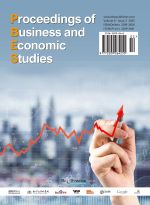Abstract
With increasingly severe global climate change, a low-carbon economy has become an inevitable trend in the development of the international community. Low-carbon economy is not only related to environmental protection but also has a profound impact on international trade. The purpose of this paper is to explore the impact of a low-carbon economy on the development of international trade and put forward corresponding strategy suggestions. By analyzing the connotation, characteristics, and mechanism of the low-carbon economy on international trade, this paper reveals the important role of the low-carbon economy in promoting the optimization of international trade structure, promoting green technology innovation, and strengthening international cooperation. At the same time, given the challenges brought by a low-carbon economy, this paper puts forward strategies such as strengthening policy guidance, promoting green technology innovation, and improving international trade rules to provide a reference for the sustainable development of international trade.
References
Ge F, Wang Z, 2024, Study on the Impact of Low-carbon Economy on the Development of International Trade and Countermeasures. Farm Economy Management, (07): 52–55.
Chen M, 2023, Study on the Impact of Low-carbon Economy on the Development of International Trade. Management and Technology of Small and Medium-sized Enterprises, (11): 160–162.
He S, 2023, Study on the Influence and Strategy of Low-carbon Economy on International Trade Development. Investment and Entrepreneurship, 34(04): 168–170.
Liu K, 2021, The Impact of Low-carbon Economy on International Trade Development. Public Investment Guide, (10): 35–36.
Zhou J, 2020, The Impact of the Continuous Development of Global Low-carbon Economy on International Trade. Hebei Enterprise, (11): 73–74.
Qin R, 2019, Discussion on the Impact of Low-carbon Economy on the Development of International Trade. Taxation, 13(13): 228.
Yang Y, 2018, Analysis on the Impact of Low-carbon Economy on the Development of International Trade. Knowledge Economy, (04): 41–42.
Wang L, 2021, Analysis on the Development Strategy of Agricultural International Trade under the Concept of Low-carbon Economy. Rural Economy and Science and Technology, (16): 135–137. https://doi.org/10.3969/j.issn.1007-7103.2021.16.047
He H, 2021, The Impact of Low-carbon Economy on International Trade Rules and China’s Countermeasures. Heilongjiang Grain Science, (9): 45–46. https://doi.org/10.3969/j.issn.1671-6019.2021.09.015
He Y, 2021, On the Development of International Trade under Low-carbon Economy. Financial News, (31): 22–23.
Fu F, 2021, Research on International Trade Based on Low Carbon Environment. Economist, (8): 61–62.
Zhang G, 2021, Discussion on the Impact of Global Low-carbon Economy on International Trade. Modern Marketing, (22): 78–79.
Wu Y, 2021, The Impact of Continuous Development of Global Low-carbon Economy on International Trade. Consumption Tribune, 2021, (21): 166.
Niu Y, 2023, Analysis on the Path of Low-carbon Economy to Promote Regional Foreign Trade. Development, (7): 59–60.
Niu Y, Analysis on the Impact of Low-carbon Economy on International Trade. Development, (10): 78–79.
Niu Y, 2024, Analysis on Regional Foreign Trade Promoted by Low-carbon Economy. Development, (1): 74–75.
Ge F, Wang Z, 2024, Research on the Impact of Low-carbon Economy on International Trade Development and Countermeasures. Farm Economic Management, (7): 52–55.
Ma M, 2024, The Impact of Low-carbon Economy on China’s Economy and Trade. Modern Business, (22): 27–30.
Chen M, 2023, Study on the Impact of Low Carbon Economy on the Development of International Trade. Management and Technology of Small and Medium-sized Enterprises, (11): 160–162.
